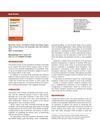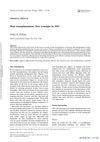 8 citations,
October 2019 in “International Journal of Dermatology”
8 citations,
October 2019 in “International Journal of Dermatology” The study concluded that combination therapy with topical corticosteroids and hydroxychloroquine or finasteride is effective in treating Frontal fibrosing alopecia in Asians.
 41 citations,
July 2002 in “Clinical and Experimental Dermatology”
41 citations,
July 2002 in “Clinical and Experimental Dermatology” Effective hair loss assessment requires a mix of precise measurement methods.
 August 2014 in “Aesthetic Surgery Journal”
August 2014 in “Aesthetic Surgery Journal” Book covers all aspects of hair restoration surgery, highly recommended.
 9 citations,
January 2005 in “Journal of Cosmetic and Laser Therapy”
9 citations,
January 2005 in “Journal of Cosmetic and Laser Therapy” In 2005, hair transplants looked natural and worked best with realistic goals, medication to preserve hair, and depended on the amount of donor hair.
 21 citations,
December 2007 in “Primary Care”
21 citations,
December 2007 in “Primary Care” Early diagnosis and treatment of PCOS is crucial to reduce emotional distress and health risks.
 32 citations,
March 2020 in “Drug Design Development and Therapy”
32 citations,
March 2020 in “Drug Design Development and Therapy” Finasteride shows promise for female hair loss, but more research needed.
 July 2021 in “International Ophthalmology”
July 2021 in “International Ophthalmology” Female hair loss patients more likely to have dry eye and gland issues.
 51 citations,
October 2002 in “British Journal of Dermatology”
51 citations,
October 2002 in “British Journal of Dermatology” Finasteride increases hair density in female androgenetic alopecia, but individual results may vary.
 36 citations,
June 2018 in “Journal of Dermatology”
36 citations,
June 2018 in “Journal of Dermatology” Use finasteride, dutasteride, and minoxidil for hair loss treatment.
 32 citations,
January 1990 in “Clinical Endocrinology”
32 citations,
January 1990 in “Clinical Endocrinology” Women with female pattern hair loss have higher levels of certain androgens, suggesting increased androgen exposure to hair follicles.
 22 citations,
March 2020 in “Journal of The American Academy of Dermatology”
22 citations,
March 2020 in “Journal of The American Academy of Dermatology” DSC cell injections significantly improved hair density and diameter, showing potential as a hair loss treatment.
 1 citations,
November 2011 in “Dermatologica Sinica”
1 citations,
November 2011 in “Dermatologica Sinica” Women using hair relaxers with alopecia had lower zinc levels, suggesting zinc deficiency might contribute to hair loss.
 1 citations,
January 2009 in “Cochrane Database of Systematic Reviews”
1 citations,
January 2009 in “Cochrane Database of Systematic Reviews” Review determines effective, safe treatments for female hair loss.
 February 2021 in “Dermatologic Therapy”
February 2021 in “Dermatologic Therapy” Injections improve hair growth, density, and thickness in women safely.

Women with androgenetic alopecia (hair loss) have normal prostate specific antigen levels but higher testosterone levels.
 1514 citations,
December 2011 in “Fertility and sterility”
1514 citations,
December 2011 in “Fertility and sterility” Experts agree that PCOS affects women's health in complex ways, but more research is needed to understand and treat it effectively.
 13 citations,
June 2015 in “International Journal of Dermatology”
13 citations,
June 2015 in “International Journal of Dermatology” Non-obese women with hair loss have higher heart disease risk.
 14 citations,
January 2018 in “Advances in Clinical Chemistry”
14 citations,
January 2018 in “Advances in Clinical Chemistry” The document concludes that hormonal biomarkers are key for diagnosing hyperandrogenemia in women and hypogonadism in men.
 8 citations,
January 2020 in “Plastic and Aesthetic Nursing”
8 citations,
January 2020 in “Plastic and Aesthetic Nursing” The article concludes that different types of hair loss require specific treatments and psychological support is important.
 4 citations,
October 2019 in “Journal of Dermatological Treatment”
4 citations,
October 2019 in “Journal of Dermatological Treatment” Monofilament Threads significantly improve hair growth in women with pattern hair loss and are safe.
 1 citations,
April 2009 in “Cochrane Database of Systematic Reviews”
1 citations,
April 2009 in “Cochrane Database of Systematic Reviews” Review finds no permanent solution for female hair loss.
 August 2019 in “Journal of The American Academy of Dermatology”
August 2019 in “Journal of The American Academy of Dermatology” Platelet-rich plasma helps hair regrowth and improves quality of life in women with hair loss, but minoxidil may be more effective.
 32 citations,
January 2014 in “Indian Journal of Dermatology, Venereology and Leprology”
32 citations,
January 2014 in “Indian Journal of Dermatology, Venereology and Leprology” Finasteride and dutasteride effectively stop or reverse hair loss in women with androgenetic alopecia, with dutasteride being more effective for women under 50.
 14 citations,
September 2020 in “Clinical, cosmetic and investigational dermatology”
14 citations,
September 2020 in “Clinical, cosmetic and investigational dermatology” The hair serum significantly improved hair growth and reduced hair fall without causing any skin issues.
 11 citations,
November 2015 in “Skin Research and Technology”
11 citations,
November 2015 in “Skin Research and Technology” Women's hair grows faster and thicker than men's, but hair growth slows for both genders with pattern hair loss.
 7 citations,
January 2018 in “International Journal of Dermatology”
7 citations,
January 2018 in “International Journal of Dermatology” AGA risk factors include age, smoking, hypertension for men, and age, dyslipidemia for women; lifestyle changes may help prevention.
 72 citations,
July 2008 in “Dermatologic Therapy”
72 citations,
July 2008 in “Dermatologic Therapy” CCCA is a scarring hair loss condition mainly in African descent women, possibly caused by genetics and hairstyling, treated with gentle hair care and medications.
 49 citations,
November 2019 in “Egyptian Journal of Medical Human Genetics”
49 citations,
November 2019 in “Egyptian Journal of Medical Human Genetics” Certain gene variants may contribute to high androgen levels in women with polycystic ovary syndrome.
 32 citations,
October 2003
32 citations,
October 2003 Spironolactone is better than placebo for reducing excessive hair growth in women, but its effectiveness for acne is unclear due to small study sizes.

Women with female pattern hair loss may have a higher risk of metabolic syndrome.





























